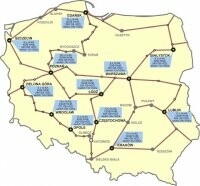
Search
Change font size
Contrast versions
The Computer Center of the University of Zielona Góra, as a university-wide unit, participates in a number of projects that serve to develop computer networks, implement and improve the quality of services.
The project involves the construction of new, unique research laboratories and the use of the existing PIONIER national fiber optic network. The main premise of the PIONIER-LAB project, which is on the Polish Research Infrastructure Roadmap, is to provide a platform for scientific units, entrepreneurs and other entities interested in conducting scientific research and development work. As part of the project, infrastructure is being developed in 21 academic centers through the creation of 8 specialized laboratories, of which the Computer Center of the University of Zielona Góra is participating in 4:
The main objective of the project is to increase the competencies of the University of Zielona Góra students, corresponding to the needs of the economy, labor market and society, as well as to support organizational changes and increase the competencies of the university's teaching staff through the implementation of a comprehensive support program.
The Computer Center is responsible for Task 13 - Support of IT tools for university management, creation of open educational resources, information management to improve the quality of education. As part of the aforementioned task, work is being carried out at the Computer Center on the modernization of the website (multiportal), implementation of the e-learning platform, and the Central Login Point.

The project is implemented within the framework of the Operational Program Knowledge Education Development (Program Operacyjny Wiedza Edukacja Rozwój - PO WER), Measure 3.5 Comprehensive programs of higher education and co-financed by the European Social Fund (ESF). The aim of the project is to improve the qualifications and professional competence of people participating in higher education, as well as to support organizational changes and increase the competence of staff within the higher education system. The Computer Center is responsible for Module 6 - Management Module in Higher Education Institutions. As part of the aforementioned task, work is being carried out at the Computer Center on the implementation and development of a web-based platform for handling activities related to conducting and documenting the course of studies (development of StudNET, PracNET, e-index, StudentUZ mobile applications), a system of virtual workstations (for administrative work as well as remote laboratories), a bibliographic system for the university, and integration of the Dziekanat 2.3 and Quatra Max systems.

MAN-HA is a project financed by EU funds and implemented by Polish MAN and NDC units for the needs of the ICT society (academic, R&D, administrative, governmental institutions, institutes of the Polish Academy of Sciences, as well as students and research companies).
The aim of the project is to integrate selected services available on the PIONIER network and develop new services with the following features: increased reliability and security, ease of access, support for federation mechanisms, work in a cloud environment.
MAN-HA is a continuation of work previously carried out by members of the PIONIER consortium in projects such as PLATON, NewMAN and KMD/KMD2, as well as activities related to CERT PIONIER and Digital Libraries.
Under the project, the existing infrastructure at the 21 MAN centers will be expanded with new elements: firewalls and servers, and software developed or purchased
The project titled "Expansion of 21 environmental ICT networks for science NewMAN" involves the selection, purchase and commissioning of modern network equipment, operating within the existing infrastructure of urban MAN networks, among which is the Zielonogórska Miejska Sieć Komputerowa ZielMAN.
Implementation of this project will allow for increase in capacity of the MAN network and enable the compilation of dynamic virtual connections and dedicated on-demand channels used by universities and scientific institutions in the implementation of national and international projects. The use of modern technology will ensure the integration of connections between research teams using different fields of science.
EduRoam (Education Roaming) – an international project to provide secure connectivity using an authentication server (Radius) and 802.1x.
Due to the demand for seamless Internet access, the University of Zielona Góra's Computer Center has expanded the wireless Internet access system at the University of Zielona Góra, joining the Europe-wide EduRoam project. Eduroam is a system operating in many countries in Europe (and beyond, e.g.: Australia), the idea of which is to provide a unified Internet access service in educational units. Eduroam users, without making changes to the configuration and without contacting administrators, can access the network at many academic institutions.
Project PLATON (Science Service Platform) assumed the creation and launch of 5 services operating on the basis of the PIONIER network. Zielonogórska Miejska Sieć Komputerowa (ZMSK ZielMAN) directly participates in the implementation of videoconferencing, eduroam, campus and scientific interactive television tasks.

The Computer Center has been home to the local computing resource of the nationwide computing grid since 2005. This cluster was created as part of the nationwide CLUSTERIX project, and the Computer Center was the main contractor and coordinator of project implementation at the University of Zielona Góra. The goal of the CLUSTERIX initiative was to develop tools and mechanisms to implement a production grid computing created from local clusters located in 12 geographically distant research centers (Fig. 1). The grid connection was implemented on the basis of the PIONIER optical network.
The Zielona Góra computing cluster consists of four 2-two processor computing nodes (64-bit) and two machines supporting the system (compiler license server, queue system, user base, network file system, firewall, etc.).
Participants in the CLUSTERIX project, including the University of Zielona Góra, signed a Grid Consortium Agreement in 2006 to continue research, development and implementation work of national and international scope initiated under the CLUSTERIX (National Linux Cluster) targeted project.



